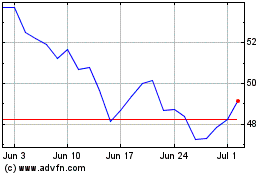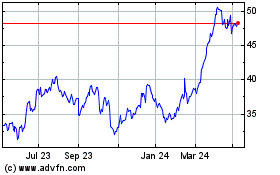By Sean McLain in Tokyo and Nick Kostov in Paris
This article is being republished as part of our daily
reproduction of WSJ.com articles that also appeared in the U.S.
print edition of The Wall Street Journal (April 6, 2020).
Spring was supposed to herald a fresh start for the troubled
car-making alliance of Renault SA and Nissan Motor Co. Executives
were hoping to grab investors' attention with a vision for the next
three years, backed up with detailed projections of profits and
sales.
So much for projecting anything. With sales evaporating and most
factories closed, the companies' leaders say they are flying blind
with no way of knowing when business will return to normal.
"I'm not sure that in 2020 any car company can make an accurate
budget today," Nissan Chief Executive Makoto Uchida said in an
interview.
He is like many CEOs around the world whose core work of setting
a vision and carrying it out has suddenly been rendered impossible
by the coronavirus pandemic. Many are taking lessons from the 2008
global financial crisis and focusing on staying viable until
whenever the world becomes more normal again.
"Simply put, we need to watch our cash management," Mr. Uchida
said.
The pandemic has hit the allied auto makers at a time when they
were already struggling. The arrest in Japan of former alliance
leader Carlos Ghosn in November 2018 set off more than a year of
management turmoil, and Nissan had seen sales fall sharply in the
U.S., its most important market.
Nissan shares have lost half their value this year, while the
overall Japanese stock market is down by a quarter. The price of
insuring against a Nissan default on its debt has quadrupled in a
month.
Moody's Investors Service on March 26 reduced Nissan's credit
rating two notches, the third downgrade in a year. It stands at the
lowest investment-grade rating, and Moody's put it on review for a
further downgrade over concerns about Nissan's ability to grow
again. Renault's credit rating was lowered to junk status by
Moody's in February.
As with the virus itself, there is no immediate elixir.
"The situation is quite clear: We're not getting any revenues
because we're not selling anything," Jean-Dominique Senard,
Renault's chairman, said in an interview.
In March, Nissan's sales fell 48% in the U.S. as car buyers
stayed home to avoid the virus. The company had hoped to pare back
discounts, but the crisis has left it with no choice: It is
offering 0% loans to new customers and no payment for 90 days.
Renault's new car registrations in France, its biggest market,
fell 72% in March, according to France's car industry association.
April is expected to be even worse, and no one has a clear view of
what will happen from May onward.
For the moment, neither company sees much point in making more
cars, even in countries where factories are permitted to operate.
Renault has shut all its plants indefinitely except in China and
South Korea, where factories have resumed work. Nissan has closed
all its plants except those in China and Japan, where some are
running at reduced capacity.
Yet the executives said that even in a crisis, it still made
sense to push forward with longer-range plans, to assure employees
and investors that the alliance has a future once the pandemic
eases. As before, they intend to announce their program for the
next three years in mid-May.
"Unless the plan is well demonstrated and digested, then the
share price will not recover and people will not believe that
Nissan will recover," Mr. Uchida, the Nissan CEO, said.
Nissan and Renault executives say they plan to end products and
businesses that show little hope of becoming profitable. That means
Nissan is expected to wind down plants in Spain, and Renault will
likely pull its namesake brand out of China, according to people
familiar with the plans. Research and engineering work will be
divided up to avoid duplication.
Billions of dollars in savings are planned, in part by more than
doubling the proportion of parts the two companies share to 75% to
80%. "All of us, we're not satisfied at all about the valuation of
our company in the market," Renault's Mr. Senard said. "We're
determined to get out of that situation."
Mr. Senard said he believed Renault could weather a downturn,
and analysts agree neither company is in immediate danger of
running out of cash.
Renault is taking advantage of the French government's expansion
of benefits by paying some white-collar staff in the Paris region
for half a day's work, while the government pays unemployment
benefits for the other half-day. It has access to state-backed
loans in France and a EUR3.5 billion ($3.8 billion) credit line it
has yet to tap. Nissan has untapped credit lines of about $12
billion.
Mr. Senard predicted that at some point car sales would come
back. But in a prolonged recession, he said, "we would be testing
the limits of a new world."
Write to Sean McLain at sean.mclain@wsj.com and Nick Kostov at
Nick.Kostov@wsj.com
(END) Dow Jones Newswires
April 06, 2020 02:47 ET (06:47 GMT)
Copyright (c) 2020 Dow Jones & Company, Inc.
Renault (EU:RNO)
Historical Stock Chart
From Mar 2024 to Apr 2024

Renault (EU:RNO)
Historical Stock Chart
From Apr 2023 to Apr 2024
